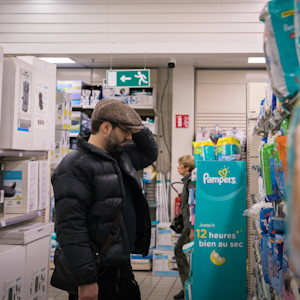Matt Grech
Content Marketing ManagerSmartling
The beginning of 2020 has introduced a major shift in how the entire world operates. With the coronavirus impacting the global population at an increasingly fast pace, both businesses and consumers of all industries are feeling the effect.
If there’s anything that this global pandemic has taught us so far, it's how connected our global community has become.
We instantly communicate with friends, family, coworkers and business partners all around the world with digital services, we rely on Facebook and Twitter to help us find the most up to date information and stay optimistic in troubling times, or we turn to digital entertainment to keep us occupied.
The digital world has become so important for connecting communities.
And during a time when fewer people are leaving their homes, they'll turn to digital experiences for shopping, entertainment, and social connections, while relying on SaaS platforms to effectively communicate and collaborate throughout all this disruption.
But it will be the translation of these apps, services, and experiences that enable us to connect with entirely new cultures and allow brands to connect with entirely new audiences, regardless of the native language spoken in that region.
Translation will be a critical crux of digital experiences that help keep our global world connected.
Digital is more important than ever
At a time when consumers demand higher quality services with less friction, digital is an easy way to essentially meet them where they already are, no matter where they are or what device they prefer.
Now is the time for brands to establish a global presence and prioritize the localization of their products, services, solutions, and offerings to reach every last person on Earth.
Brands will need to evaluate their current processes and offerings to stay afloat during this time. This effect ripples across massive industries, from travel and hospitality to in-person entertainment and retail.
Entertainment with personal boundaries does not necessarily mean entertainment with regional boundaries.
It almost goes without saying, but digital services like Disney+ and Netflix, online video games, communication platforms like discord and online hubs for news and discussion like Reddit and Twitter are experiencing a massive spike. So much so that streaming services are limiting video quality around the world.
Translation will play a pivotal role in delivering these experiences to the population and fostering connections between communities that otherwise may have never interacted before.
The idea that we can use machine translation to translate online comments and discussions -- or even just translating tweets in real-time -- enables communication around the globe on a completely new level.
With translation, when we're all huddled around our screens trying to stay entertained, we have the chance to explore new content from all over the world without limitation.
This unique situation offers a unique opportunity for brands to pivot and explore how they ingrain translation within their experience.
SaaS is now a necessity
SaaS platforms have quickly become the new way of life for most businesses. Cloud tools enable departments to collaborate remotely with the same efficiency as a team huddled around the same desk.
Throughout all of this, Zoom is experiencing record numbers, between schools relying on the platform to help teachers and students connect, businesses relying on the service to carry out critical meetings, and even friends and family utilizing Zoom to host video calls with their entire social circle.
The same goes for chat platforms like Slack, or even WeChat which includes an element of digital payment.
The entire population is shifting digital, and the SaaS platforms that were once considered a step-up from legacy software are now a clear necessity.
And by translating these experiences, and opening up these platforms to users around the world, brands can enable new levels of productivity and collaboration, despite this disruption.
Translation Helps The World Stay Connected
If you are a software company, your product is global from day zero. As long as users have internet access, your product will be available for use around the world, so it must be accessible to different regions around the world from the very beginning.
Therefore, translation is an absolute key to the potential of your product, and the ability to foster connections between individuals around the entire world.
The benefit is two-fold: the tool becomes accessible to entirely new regions, enabling businesses all over the world to take advantage of the tools at their disposal, but also this enables a new level of connectivity between two regions that may have previously been unable to collaborate as efficiently.
Adapting your experience
But enabling the world to connect through your app or service may not also be as simple as just translating. World readiness extends beyond the right language choice for a new market and dives deeper into several key elements of your solution: the right price, the right product offering, and the right content and the right processes to bring it all together.
Brands should take care to properly localize their services and solutions for the region they're developing: they should seek to offer the best possible user experience, the same UX that has made their service or app so popular in other regions.
By incorporating these local and cultural elements -- which can be as simple as swapping the color blue for the color red because one has a more significant meaning than the other, or as complex as redesigning the characters in your game -- you will create an experience that is engaging to those users.
With an engaging and compelling user-experience, people will genuinely want to use your service to connect and communicate. Just look at how quickly our current giants became the standard for information sharing, by developing a solid user experience.
And don't forget about the people involved in the process. Smartling translators are native speakers of the language they translate for and often live in the region they’re translating for. This enables them to act as cultural ambassadors for your brand, offering deep insight into the users and clients your business will be serving.
Collaborating with translators and linguistics, as well as conducting necessary market research will enable your brand to alter and tailor products, offerings, solutions and services to the unique demands of each new region.
The Bottom Line
The current situation at the beginning of 2020 has proven that the world has grown more connected than ever before. Despite borders closings, flights completely halted, and even trade slowing down, humans are remaining in contact more than ever before.
We're leveraging the digital experiences we have so grown accustomed to in order to help us stay informed, entertained, and even healthy.
And by translating these platforms, brands can open up these connections to entire populations, extended our global community to entirely new regions, cultures, ideas, and people.
In a time when so many of us are stuck at home, it's more important than ever for brands to translate their experiences.











